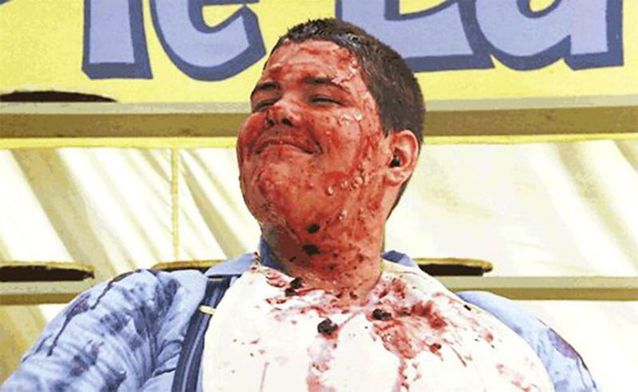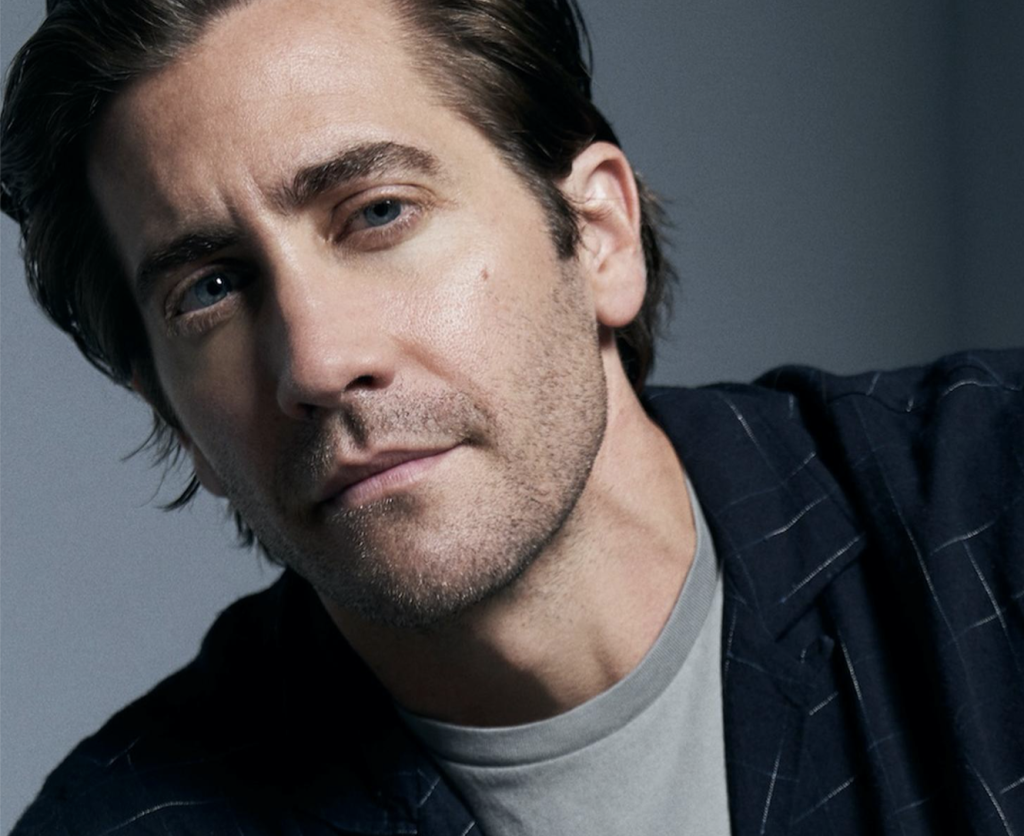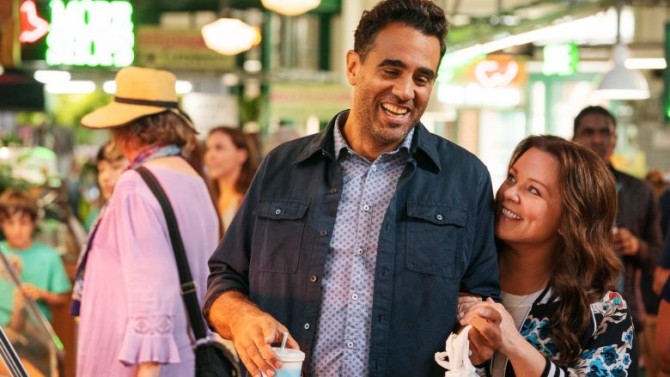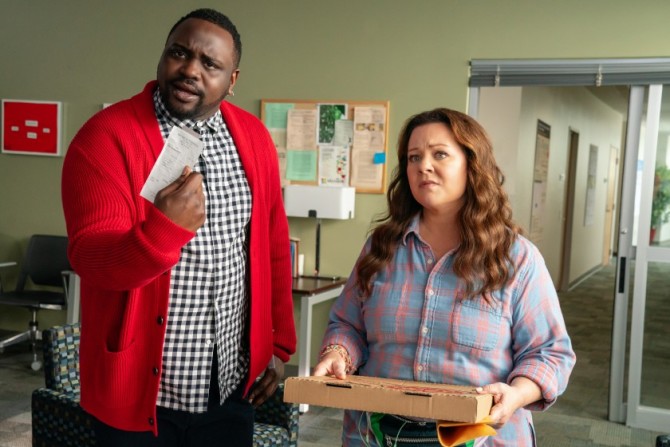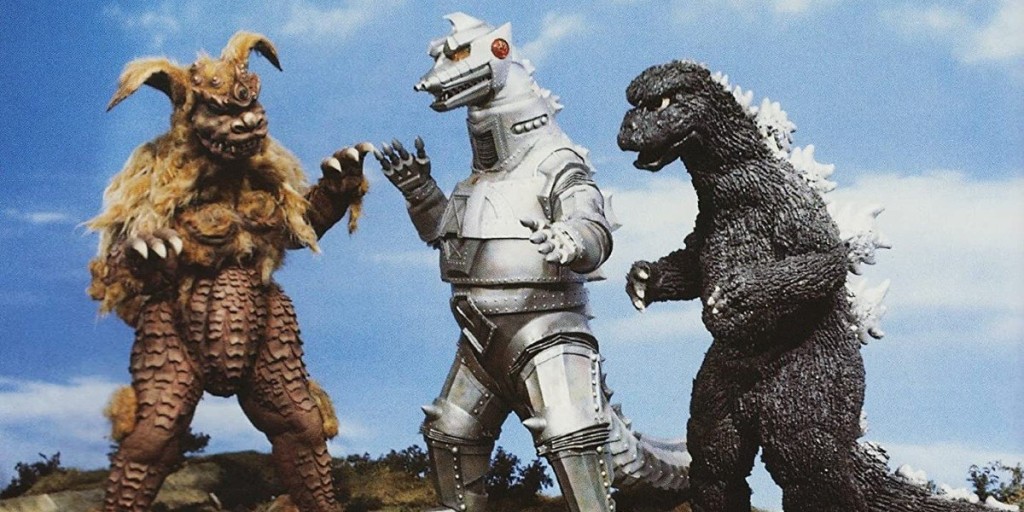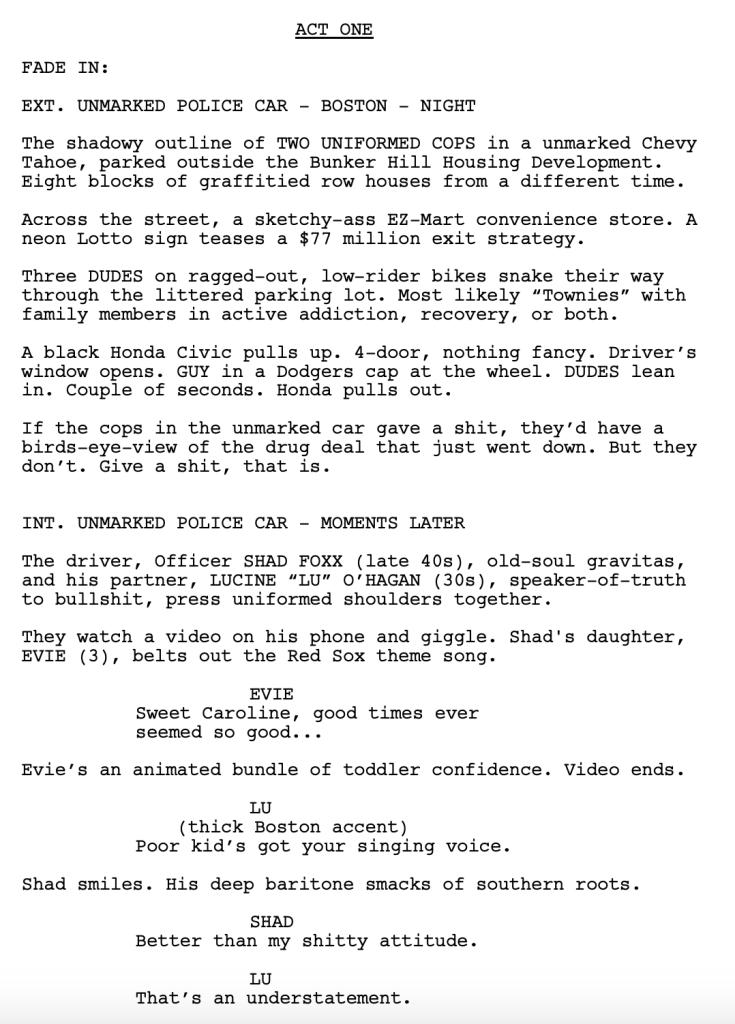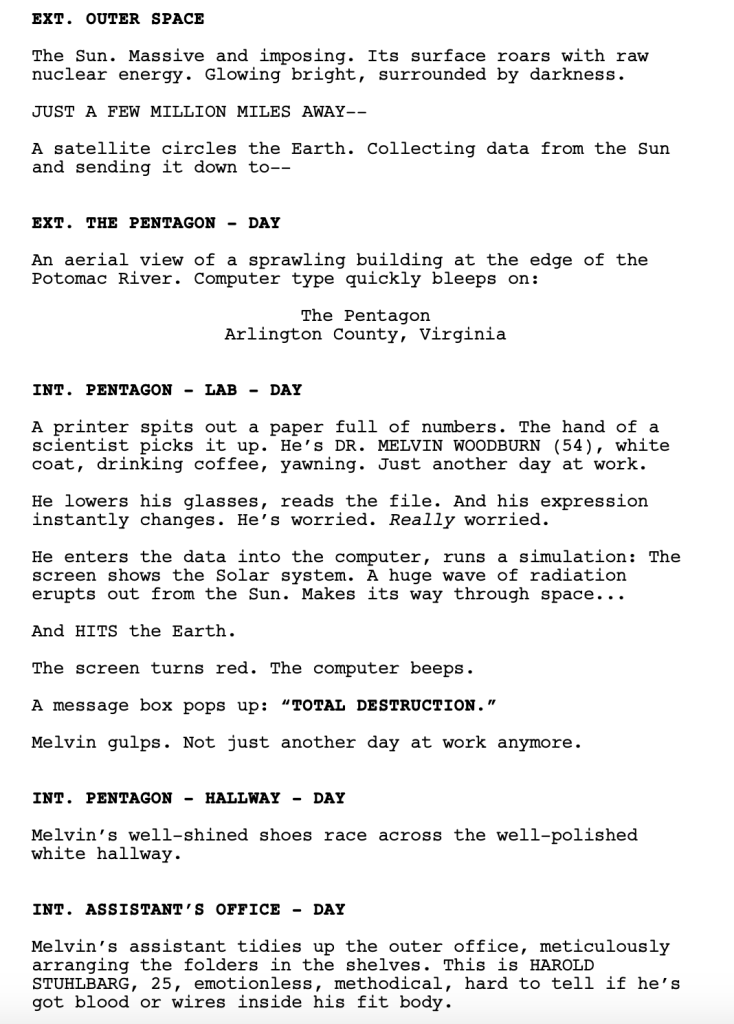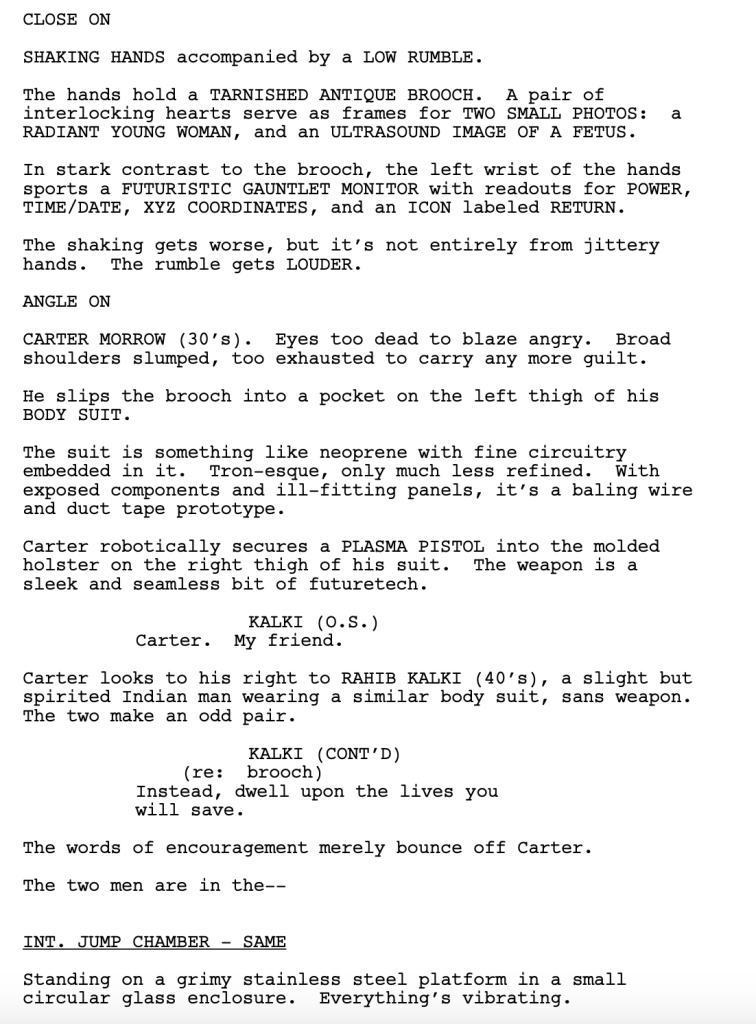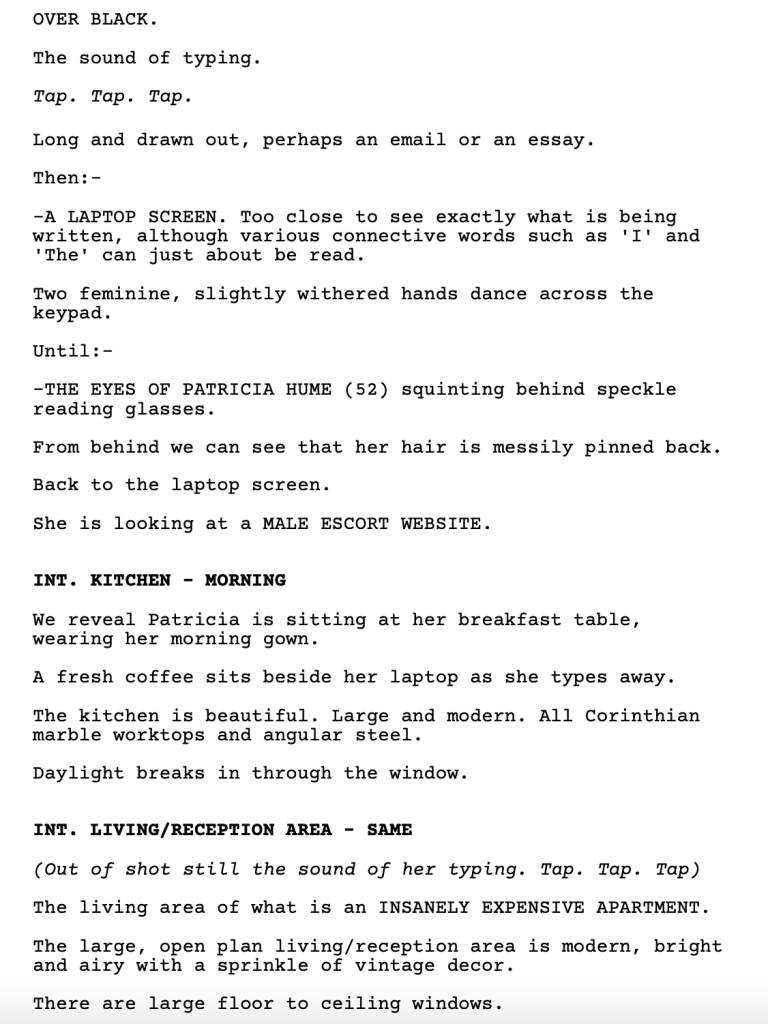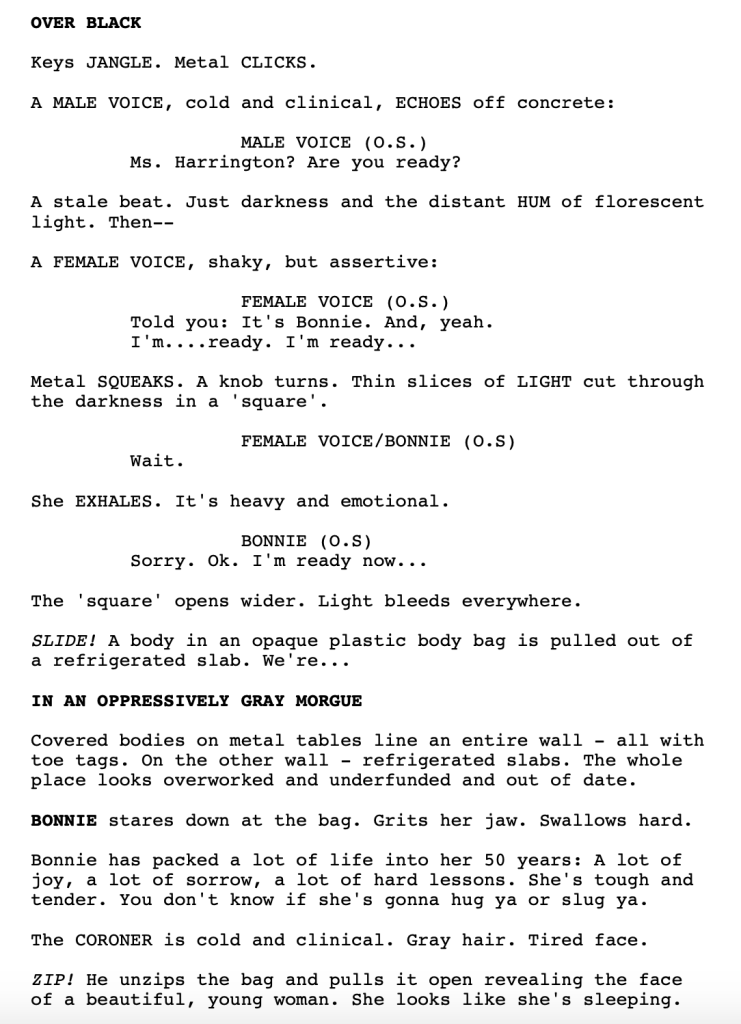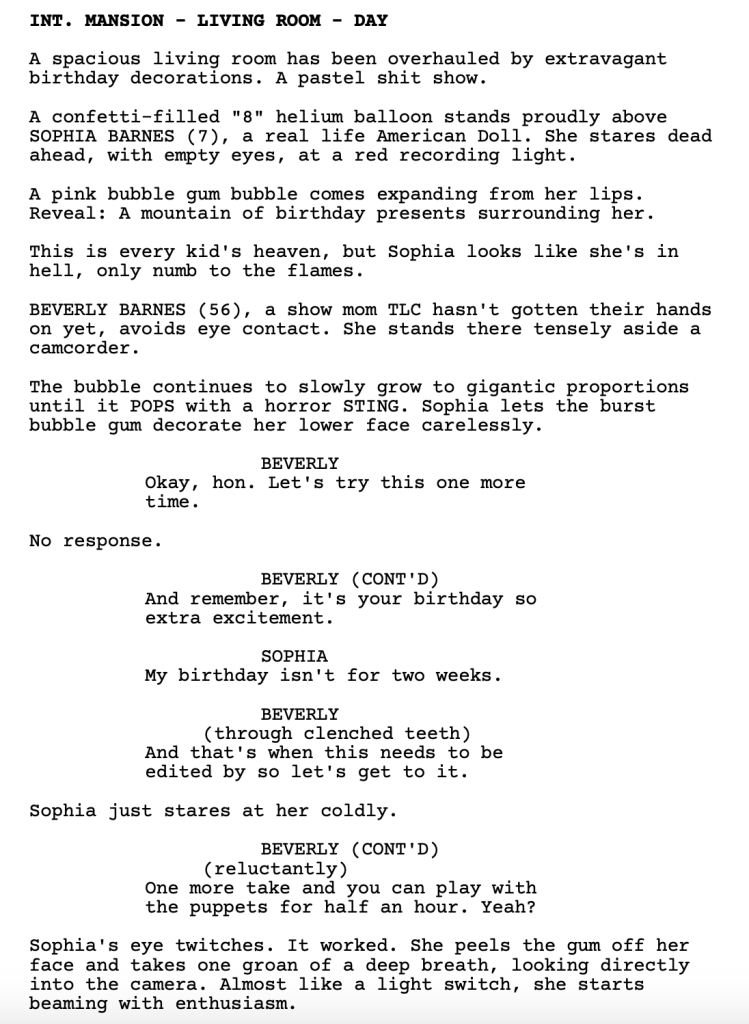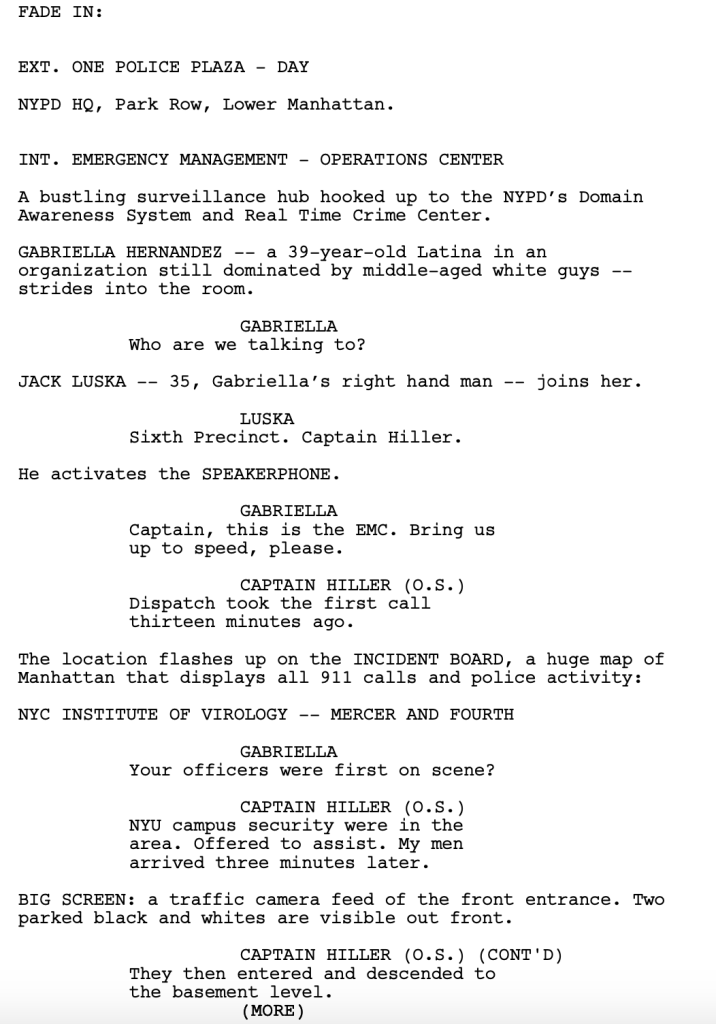Many years ago I went to one of those Screenwriting Expos.
I think that’s what it was called, actually – “The Screenwriting Expo.”
This was back in the day when the word “e-mail” was as buzzy as saying “TikTok.” “You’ve got mail” was as addictive a sound as the “ding” you hear when you get a new text. It was the original dopamine hit. In other words, it was a simpler time. And a world where the only screenwriting information you could get was from books and expos. So I was excited to be there.
However, the more I walked around the place, the more I realized it was nothing more than a giant excuse for bottom feeder industry types to hawk their wares and get you to sign up for classes or mentorships or newsletters you didn’t want to sign up for. I went from top of the world to ‘lost all faith in humanity’ in 60 minutes.
However, there was one teacher from the Expo I still remember. I don’t remember his name (for the purposes of this article, I’ll call him Jason). But what I do remember is that he was passionate, a stark contrast to the 200 other tricksters who leered at everyone as if they were giant walking wallets.
After everyone who’d signed up for the class arrived, Jason popped in a DVD of “Stand By Me,” and proceeded to pause it every so often to explain the screenwriting mechanisms that were going on underneath the surface.
It was instructional, effective, and fun, due to his outsized passion for the movie. I mean, I dug Stand By Me. But this guy really REALLY liked Stand By Me.
The part that he liked the most still sticks with me to this day. Jason went bonkers over Gordie’s midpoint story to his friends about a pie-eating contest. If you haven’t seen the film or don’t remember it, it’s about four 12-year-old friends who travel across the state to see a rumored dead body in the woods.
The scene in question occurs as the friends are taking a break and they ask Gordie (this is based on a Stephen King story so, of course, there has to be one writer in the mix) to tell them a story. We then cut out of the kids story and for EIGHT ENTIRE MINUTES we get a story THAT HAS NOTHING TO DO WITH ANYTHING ELSE IN THE MOVIE. I capitalize that because that’s what this teacher kept emphasizing.
“EIGHT MINUTES! EIGHT MINUTES THE STORY WENT ON! AND IT HAD NOTHING TO DO WITH ANYTHING ELSE IN THE MOVIE!”
The story Gordie tells is funny. It’s about an overweight kid who enters a pie-eating contest and the experience is so overwhelming that, at the end of it, he throws up. That leads to the other contestants throwing up. Which then leads to the audience throwing up. Soon everybody is throwing up.
Jason kept hitting on the fact that you just “don’t do this.” You don’t stop your movie for eight minutes to introduce brand new characters and a brand new story that has nothing to do with anything else in the movie. If these characters were related to our heroes, you could justify it. If these characters somehow came back into the story later on, you could justify it. But none of that happens. It’s its own self-contained movie within a movie.
Jason was so obsessed with this little scene that, over the years, I’d find myself recalling the famed sequence and wondering why he’d gotten so worked up about it. His point seemed to be contradictory. He both loved the scene but was baffled that they’d included it. I couldn’t resolve what his message was.
Flash-forward to 2020. I’m reading a script just a few days ago from a very talented writer. He’d written a road trip movie and, during the script, one of the main characters tells a story that we flash back to. The story, like Stand By Me, was eight pages long. The story, like Stand By Me, wasn’t directly connected to anything else in the plot.
The flashback was pretty good, mainly because the writer was good. But as I weighed the flashback’s impact, I couldn’t help but realize it took up a full 10% of the screenplay. 1/10th of the script was dedicated to a story that wasn’t connected to the plot. What I mean by “not connected” is if you were to eliminate the flashback, nothing else in the script would have to be rewritten. That’s the easiest way to identify if something is necessary in your script or not. If you can get rid of it and you don’t need to make a single other change anywhere? It probably wasn’t a necessary scene.
Analyzing this sequence brought me back to Jason’s Stand By Me class. Because I finally understood what he meant. If a scene is not moving the story forward, it’s either a) pausing it, or b) moving it backwards. As a screenwriter, you want to avoid both of those things. Pausing and going backwards are antithetical to keeping an audience invested. Therefore, you should avoid them.
What Jason was saying was that the screenwriters for Stand By Me, Bruce Evans and Raynold Gideon, knew this. They understood that each scene must push the story forward. And that this pie eating story tangent wouldn’t do that. However, they decided that the scene was still worth it anyway. I suspect they felt it helped viewers understand Gordie better, since it showed how talented a storyteller he was and gave us some insight into him as a person (since you can get a feel for a person by the kind of stories they gravitate to).
As screenwriters, making sure every scene moves the story forward is one of the most important pieces of advice we can follow. The scripts that derail the quickest are the ones where too many scenes aren’t pushing the story forward. Think of it like a car ride. As long as you’re moving forward, you’re happy. But the second you get stopped in traffic. Or the second you get stuck behind a long stoplight, you start feeling anxiety. You didn’t get in the car to stop. You got in it to continually move forward until you got to your destination. A script read works the same way. If there’s too much stopping (scenes that don’t push the story forward), the reader gets anxious. And, at a certain point, that anxiety hits a breaking point. We’re out.
Of course, that doesn’t mean you can never write a scene/sequence that doesn’t move the story forward. Like the pie-eating contest. As long as you recognize that it’s a gamble and that, therefore, the scene has to be amazing, you should be okay. Just don’t make a habit out of including these scenes. Jason was quick to point out that every other scene in the movie pushed the story forward.
The next project from the 10 Cloverfield Lane writers!
Genre: Sci-Fi (Short Story)
Premise: Set in the future, a former serial killer is “rightminded,” the process of digitally altering the brain to take away its psychopathic tendencies.
About: This short story from 2014 sold earlier this year for the 10 Cloverfield Lane writing team, Josh Campbell & Matt Stuecken, to adapt. The short story comes from Elizabeth Bear, who’s won two Hugo Awards, one for short story Tideline, with follows a sentient war machine that is the only survivor of an apocalyptic war that has reduced the human population to cavemen. And the other for her novelette, Shoggoths in Bloom, about the famed HP Lovecraft monster, the shaggoth.
Writer: Elizabeth Bear
Details: about 5000 words (you can read it here)
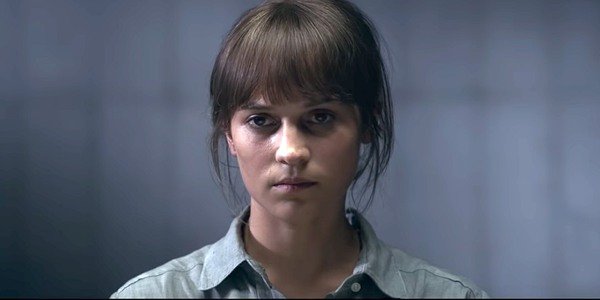
This idea of serial killers getting mind-altering treatment to take away their killing impulses is not a new one. I’ve probably read five full scripts covering the same subject matter over the past decade. But that’s not necessarily a bad thing. If lots of people are gravitating towards the same idea, that means there’s something to that idea. And if no movie of worth has yet been made with that concept, then why shouldn’t you be the one to do it?
It’s a reminder, though, that a good concept doesn’t naturally translate into a good script. The reasons for why vary, but mostly it comes down to weak writers exploring the most obvious route of the idea. That’s definitely not what we get today. This story is quite complex and gets you thinking. Which may be the reason why it becomes the version of this concept that finally makes it to the finish line.
Our unnamed narrator killed 13 women. And even though he’s been caught and placed in prison, he wants to kill more. In fact, when his female lawyer tells him about this new technology that can eliminate his impulse to kill, all he can think about the entire conversation is the number of ways in which he could kill her.
It’s hubris that dooms him, however. He doesn’t volunteer for the treatment because he wants to be a better human being. Quite the opposite. He plans to keep killing for the rest of his life. He volunteers for the treatment because he believes he can beat it.
Now here’s where things get a little confusing, so stay with me. In addition to changing your brain, the government wants to push you as far away from that killer as possible. So they also change your look and your insides. It is decided that our narrator will become a woman.
Back to present day, where our female narrator, who no longer has those impulses, is jogging on the outskirts of town during winter. A few minutes after helping a driver with directions, she’s attacked from behind. The directions were a ruse. And when our narrator wakes up, she’s in a cold dark basement. The situation is not unlike the scenarios she put her own former victims through.
But it’s that familiarity with what’s happening that allows our narrator to stay calm. She slowly and methodically picks away her restraints and then waits by the doorway for her captor to return. When he does, she viciously attacks him. But seeing as she’s now a woman, she’s much smaller and much weaker than before. It doesn’t look like she’s going to defeat him. At least the 13 families of the women she killed will be happy. Unless, of course, she can find one last burst of energy and get the heck out of here.
I liked this.
Bear is a strong writer. You can tell right off the bat that she has an ease with words, sentences, exposition, prose, that make for a more advanced read than you’re used to. “This cold could kill me, but it’s no worse than the memories. Endurable as long as I keep moving. My feet drum the snow-scraped roadbed as I swing past the police station at the top of the hill. Each exhale plumes through my mask, but insulating synthetics warm my inhalations enough so they do not sting and seize my lungs.” You feel like you’re in good hands, that’s for sure.
Let’s talk about the execution. Like I mentioned above, I’ve seen this idea before. What is Bear doing better than everyone else? That’s simple. She’s integrating irony into the execution. This isn’t yet another “helpless woman gets kidnapped by a serial killer” story. It’s about a serial killer who gets kidnapped by a serial killer. In other words, there’s a heavy dose of irony baked into the setup.
Now I’m not going to say the setup is perfect. Bear conveniently hurries through the explanation of why our narrator needed to be changed into a woman. Methinks Bear knew that the later kidnapping played better if our protagonist was a woman so just sort of threw some science fiction gibble gabble explanation in there as to why part of the treatment was changing the killer’s gender. But it’s one of the only weak parts of the story and since almost everything else was so well done, I didn’t allow it to destroy my suspension of disbelief.
Bear’s skills come into play the strongest when she has to write exposition. Exposition is the writing equivalent of fresh breath. When someone has it, you don’t think about it. But the second you smell bad breath, your romantic interest in that person nosedives. Same is true for exposition. Done well, you don’t notice it. Done poorly, and it’s all you think about.
There’s this sequence early on where the lawyer is explaining to the narrator (when he’s still a man) the process of “rightminding.” It’s an exposition-heavy exchange that would’ve tripped up a lot of lesser writers. But Bear does something clever. She intersperses the lawyer’s exposition with the thoughts of our narrator, who is thinking of the many different ways he’d love to kill her. It takes an average exposition-heavy scene and makes it interesting.
But the real accomplishment of this story is the complexity in which we see the main character. On the one hand, the protagonist is the only person we sympathize with. We’re in their head with them. So we want to see them survive. On the other hand, we know who they were. That they killed 13 women. So there’s also a part of us who wants to see this kidnapper kill our protagonist.
When everything is too straight-forward, it’s often boring. You want complexity of thought to be involved in parts of your story. It’s the same thing I talked about yesterday, with the amazing script, “Ambulance.” When all four parties converge on that ambulance, I was rooting for all for them, even though they weren’t on the same team. That’s when your script starts transitioning from 2-D to 3-D. It’s worth looking for storylines that create that kind of complexity.
One last gripe – the ending. Which I will kind of spoil here.
For all of their outstanding writing abilities, these talented award-winning short story writers all seem to have the same weakness, which is that they wimp out on the ending. They’re terrified of giving you a definite end, so they all cut out before a clear ending occurs. I’m sure lots of writers will defend this move. But what they can’t defend is that if I know exactly what your ending is going to be before you write it, you’ve chosen the wrong ending. And I knew Bear wasn’t going to tell us whether our narrator lived or died. So even though you picked the literary acceptable ending that English Professors would give you an A on, you failed the reader test. And we’re the ones who matter.
So PLEASE don’t make that same mistake with the movie version. Because this one has potential.
[ ] What the hell did I just read?
[ ] wasn’t for me
[x] worth the read
[ ] impressive
[ ] genius
What I learned: Never underestimate the power of movement. – This story starts with the narrator talking to us during a jog. The narrator’s thoughts themselves aren’t the most interesting in the world. Not to mention, there’s exposition in there. But it didn’t bother me as much as it usually does because the main character was moving. They were going somewhere. Even if that somewhere was just the end of the jog. I don’t know what it is about movement but it helps speed up otherwise slow sections. I suppose it’s a psychological thing. But I knew it was working when I thought how much more boring her thoughts would be had she been giving us them while sitting down on her couch. I was reminded of this while reading a recent screenplay that had a large flashback scene early on. You know how much I hate flashbacks. But the character who was sharing the flashback was in a car driving with his friend. The mere fact that we were going somewhere made that flashback more bearable.
Today, I do something that I’ve never done before in all my history of reading scripts. And it’s because this might be one of the best action scripts ever written.
Genre: Action
Premise: After a bank robbery gone wrong, two brothers attempt to use a stolen ambulance as a getaway car.
About: This project came together last week with Jake Gyllenhaal and Michael Bay signing on. It’s based on a Danish film. Screenwriter Chris Fedak has an interesting past. He’s written/created a bunch of solid TV shows (Prodigal Son, Chuck, Legends of Tomorrow) but nothing to indicate he was capable of this level of awesomeness.
Writer: Chris Fedak (based on the film “Ambulancen”)
Details: 131 pages.
We’re going to get straight to it. No fluff in this review!
Will Sharp is a vet who’s trying to make as much money as is possible since his wife’s cancer bills are through the roof. And what little money he has left from her illness, he has to find a way to feed and clothe his daughter. Despite all this, Will refuses to go back to the life of crime he was once part of. He’s going to do things right.
But during a routine check-up on his older convict brother, Danny, he learns that Danny and his gang need a driver for a bank robbery. Will says no way until Danny gives him the number. $32 million. Holy Schnikees. That would solve everything. Okay, Will says, when is it? Next month? Next week? “Right now,” Danny says.
We then cut to several other players in the story. There’s Camille (Cam), an EMT who nobody’s able to get close to. There’s Mark and Zach, two cops. And there’s Kathy, a news helicopter person who’s just been told that her dream job, working the news desk, was handed to someone younger and prettier. By the way, this all takes place in Los Angeles.
Just before Will, Danny, and the team get to the bank, we cut to our cops, Mark and Zach, who just left the bank. Mark is mad at Zach because he likes this teller at the bank and, once again, Zach didn’t ask her out. We’re going back to the bank and you’re going to ask her out now, Mark says. He spins the car around and back to the bank they go. Back to the bank THAT IS BEING ROBBED they go.
Of course, Zach doesn’t know the bank is being robbed when he walks in. He only sees the bank manager, who we know is actually Danny the bad guy but Zach does not. Danny says they’re doing some emergency cleaning and the bank will be open again in 30 minutes. Zach sees the teller he likes, though, and asks if he can quickly open an account. Not wanting to spook a cop, Danny tells him ‘sure.’ And that’s when the poop hits the fan.
Zach sniffs out there’s something wrong with the teller. But Danny is on him within seconds. “Don’t do anything and you’ll get out of this okay.” Meanwhile, outside, Mark senses something is off. He goes around back and sees big men carrying big bags. It’s a robbery. Mark warns them and a shootout begins. Back inside, Zach is able to get loose from Danny and now there’s a firefight in the bank as well.
People start running. The plan is falling apart. Meanwhile, Will gets to the adjacent parking garage where he runs into Zach. It’s kill or be killed so he shoots Zach. Oh shit. He’s a cop killer now. His brother joins him and now they’re moving through the parking garage as cops surround the building. Then Camille’s ambulance pulls in where Mark is now carrying his almost-dead partner Zach towards her. Camille and her EMT partner put him in the ambulance, which is then cut off by you-know-who, Will and Danny. They realize this thing is their only shot out of here.
So they jump in, with Danny killing Camille’s partner, pushing her in the back with the dying Zach, and Will taking the wheel. The irony is not lost on Will. The cop he shot is now being kept alive in the ambulance he’s using as his getaway car. The cover of the ambulance allows them to get past the cop brigade outside but it doesn’t take those cops long to realize they’ve been duped. And that means we’re in for a good old fashioned car chase through the car chase capital of the country, Los Angeles.
They’ll be chased by a raging Mark, who wants to save his partner, and a determined Chopper Kathy, who realizes this is her only shot to become the big successful newswoman she’s always dreamed of. There are many others who join in as well, as the chase quickly turns into national news, with bigger and bigger people injecting their hand into this crazy event. Will Will and his brother come out of this alive? I honestly don’t know. And that’s the first thing I want to talk about.
This script is so good, my friends, that I did something I’ve never done before. I STOPPED READING before the final act. Why? Because this was such an amazing script that I didn’t want to spoil the ending for myself. I want to wait until the movie comes out to see what happens. This is really amazing stuff.
Right away, I knew I was dealing with a good writer. Fedak conveyed that Will was a vet, that he needed money, that his wife was sick with cancer, that he had a kid, that he was desperately looking for a job, and that he had conflicted feelings about his brother, all within the first two pages. And not in a “just the facts ma’am” boring way. But within the flow of the story. It never felt like exposition. That’s when I knew, this writer is for real.
From there, two things happened that solidified how good of a writer Fedak was. When Will goes to see his brother and his brother tells him about the bank robbing job, Will asks him when it’s going to be. Danny says “now.” I know so many writers who would’ve pushed the robbery 20-30-40 pages ahead. Fedak understands that you don’t have time in a spec script. You have to keep things moving. And what moves faster that RIGHT NOW.
The next thing was the bank robbery. Let me throw this scenario at you. You’re writing a bank robbery scene in your script. Go ahead, imagine how you’re going to write it. I’ll wait a second. Think the whole thing through. Okay, did your bank robbers storm into the bank and tell everyone to get down on the ground? If so, you’ve already failed the test. Never ever do that. Why? Because I’ve watched 2000 bank robbery scenes and every one does that. Do your characters then tell everyone to shut up and not to be a hero today? If so, you failed the second test. The characters in these movies always say the same thing.
What happens in “Ambulance?”
THEY DON’T EVEN SHOW THE ROBBERY!!!
We don’t see it. Instead, we only see the tail end of it when Zach comes in to ask the teller out. Fedak understands that you already know how bank robberies work. He doesn’t need to show you something you already know. So, instead, we cut to it in progress, which allows for a great little dramatic irony scene where we know a bank robbery is going on but Zach does not.
But the moment where I knew I was reading somebody who was on another level from your average professional was the moment when our brothers get in the ambulance. I thought to myself, “Wow.” Fedak did such an amazing job setting up all these characters with just a little bit of time that when they all collide at this ambulance, we sympathize with every single one of them. Think about how difficult that is. Most writers can’t make you sympathize with their protagonist. Case in point, yesterday’s movie, Superintelligence. You have one of the most likable actresses in the world playing the lead and I couldn’t give two craps whether this superintelligence killed her or not.
Conversely, we have these two brothers, both of whom are in this robbery for completely different reasons, allowing for natural conflict between them. We have Camille, who’s this mysterious figure who’s great at her job but who nobody really knows. Most importantly, we have Zach, the guy Will shot, who is dying. Which means that during this getaway, which is going to last the entire movie, we’re going to have a secondary storyline of keeping him alive. Two dramas for the price of one. Genius.
I don’t think I’m conveying how great of an idea this was. Most writers wouldn’t have put anybody in the back of the ambulance. They probably would’ve had the ambulance be the vehicle they rode into the robbery in from the start and they wouldn’t have placed anybody back there, dying. The fact that Fedak created this whole storyline with an EMT and dying patient that one of our protagonists shot? That’s next level story construction. When you’re talking about what separates average writers from really good writers, it’s stuff like this.
And, on top of all this, Fedak breaks the rules. I say it here all the time. How you break the rules is the key to making a script great. No script where you follow all the rules is going to be good. It might be okay. But to separate yourself, you have to break the rules somewhere. The rule broken here is that there isn’t just one protagonist. There are six. Normally, I hate that. But Fedak does such an amazing job setting all these people up and making you care about them, that you’re invested in each one of their stories. There’s this moment near the midpoint where Mark is chasing the ambulance and trying to do that cop swerve-spin maneuver, and Will and Danny are trying to fight him off, and I couldn’t decide who it was I wanted to win. I was rooting for everyone. That is so rare in a screenplay.
As much as I want to give this a ‘genius’ rating, I can’t because I haven’t read the final act and the final act has to live up to the amazing first two acts to achieve genius status. So I’m going to give it a double-impressive. If you are an action writer, READ THIS SCRIPT. You will learn so much about screenwriting.
[ ] What the hell did I just read?
[ ] wasn’t for me
[ ] worth the read
[xx] impressive
[ ] genius
What I learned: This script taught me that the main action in an action script might not be enough. You should ask if there’s a secondary storyline you can add to the main action. So here, we could’ve stopped at using the ambulance as a getaway vehicle. It’s an admittedly cool idea all by itself. But it only gives you so much story to see them try and escape in an ambulance. By adding a dying person in the back of the ambulance, you give the reader a secondary storyline that makes a good idea even more exciting.
Genre: Comedy?
Premise: (from IMDB) When an all-powerful Superintelligence chooses to study average Carol Peters, the fate of the world hangs in the balance. As the A.I. decides to enslave, save or destroy humanity, it’s up to Carol to prove that people are worth saving.
About: A lot of people will focus on the terrible Rotten Tomatoes score of Superintelligence (26%). But Superintelligence actually achieves a rarity for any comedy, which is to get a worse audience score (23%) than critic score. Audiences are always more forgiving with comedy than critics. Which means this must be a really really really really really bad movie. Melissa McCarthy teams up, once again, with her husband, Ben Falcone, who directed the film and basically wrote it as well. This winning combo has created Tammy, Life of the Party, and The Boss.
Writer: Steve Mallory (but from what I understand, Falcone and McCarthy basically told the writer what to write)
Details: 2 hours of hell
First of all, you’re probably wondering why I’m reviewing this. I’ll tell you. This is one of the worst pieces of professional entertainment I’ve ever seen. Normally, I’d take that in and move on with my life. But I can’t. I can’t because if there’s one thing that bothers me about this business, it’s when someone with less-than-zero talent gets millions of dollars to make movies.
I’m not dumb. I understand that untalented people weasel their way into every industry. And, truth be told, they only make up about 10-15% of those industries. But their level of ineptitude is so extreme, that it always feels like a lot more than that. And Ben Falcone has to be the single most untalented writer and director I’ve ever seen get this many opportunities in Hollywood.
Of course, he has an ace up his sleeve. He’s married to Melissa McCarthy, who, ironically, is one of the most talented people in the business. I’m a huge Melissa McCarthy fan. Go to Youtube right now and search “SNL Melissa McCarthy.” There’s a reason no SNL host has more video views than her. She’s hilarious. And that’s what makes this all the more frustrating. Falcone’s lack of talent isn’t just dooming him. It’s taking down someone who actually has talent. Someone who should be making much better movies.
I’m going to try to summarize the plot of Superintelligence for you. But I’m giving you advance warning that the nonsensical nature of everything you’re about to read is going to make it sound like I didn’t understand it. No, this was the actual plot.
Carol Peters – the nicest person in the world – lives in Seattle and is trying to find a non-profit job. She’s having some trouble and, yet, that doesn’t seem to play into the plot at all. In other words, if she fails to get a job, it doesn’t sound like it will affect her life in any way.
Why does this matter? Because, later, the Superintelligence will buy Carol a 5 million dollar apartment, a 100,000 dollar car, and put 10 million in her bank account. But since Carol has never needed or wanted money, these developments feel random and unimportant. I’m sorry. I’m getting ahead of myself.
Out of nowhere, the first ever self-thinking AI contacts Carol, presenting itself as James Corden, since Corden is Carol’s favorite TV personality. The AI says it’s going to destroy humanity in 72 hours. Why? No idea. Never says. Probably best we not get into the specifics as we will then find out that if he destroys humanity, he also destroys himself, which would make absolutely no sense. But what in this movie does make sense?
First, AI James Corden says, he wants to learn about humanity. And he’s ID’d Carol as the perfect guinea pig. Why did he pick Carol specifically, though? No idea. To Falcone’s credit, this question is asked like 50 times in the movie. And yet, nobody answers it. Even AI James Corden answers it once and we don’t understand his explanation. ANYWAY!
To learn about humanity, AI James Corden asks Carol what she would do if she only had three days to live, since she does. She says make things right with her ex-boyfriend, George. Coincidentally, in the only attempt at writing an actual screenplay, George is moving to a new city in three days. So Carol better hurry up! Wait a minute. Do we even need a ticking time bomb with the George relationship if the earth is going to blow up in 3 days? Oh, who needs logic in screenwriting? MOVING ON!
As if understanding just how bad this script is, AI James Corden attempts to help out, giving himself a motivation for why he wants these two to be together. He wants to “better understand humanity” you see. And seeing if Carol can rekindle her relationship with George will somehow… achieve this? Maybe?
Quick plot summary break here cause I’m about to explode with anger. This script is so bad that I am positive it would finish fifth in voting an any Scriptshadow Amateur Showdown. That’s how bad this. It can’t even beat an average amateur screenplay. One of the primary issues with a bad script is that every screw is loose. It’s not clear why James Corden is going to blow up the world. It’s not clear why he wants Carol and George to rekindle their relationship. It’s not clear what Carol’s financial situation is or why she can be eternally jobless and not have to worry about money. Every single aspect of the script is vague. That’s bad writing. And for screenwriting this bad to be produced? Shame on these people. Seriously. Shame on them.
Sorry, I got distracted again. Where were we with the plot? Oh yeah, so the US Defense Department gets wind of the AI and is going to turn off the entire internet except for one small computer, trapping the AI there and then killing it, which is the only well thought out plot point in the entire movie. But AI James Corden gets wind of this and makes it impossible to turn him off.
However, at the last second, he has a change of heart when Carol does something unexpected (she doesn’t tell George about the impending doom). This makes AI James Corden realize that he has a lot to learn about humanity, so, okay fine, he’ll keep them around for a while. The End.
First of all, James Corden. You need to do better. You’re very talented but you’re George Clooney level at picking your projects. Have your agent start picking them for you.
Okay, maybe I can take a break from being so angry and use this opportunity to teach some lessons here. Unlikely but I’ll try.
Concept. When a concept is weak, nothing you write will matter. A concept is what forms your movie. It is the initial structural beam. Without a strong one, you’ll spend your entire script in “search mode,” where you’re searching for the story. Guess what, you won’t find it. You need to have done the work in the concept stage.
Superintelligence is not a concept. It’s a concept fragment. The only part that has concept potential is the superintelligence part. But then you need something that the superintelligence interrupts that is clever or ironic or has some form to it. A superintelligence studying an average person is not a concept. A superintelligence studying the dumbest person in the world still isn’t a movie-level concept, in my opinion, but it’s better. The irony of the highest intelligence trying to learn from the dumbest intelligence has some irony baked into it.
The biggest clue that this isn’t a concept is that you would have the exact same movie without the superintelligence part! This movie is about a woman who reconnects with an ex-boyfriend. You didn’t need the superintelligence for that. Like we already established, you didn’t even need the 72 hours before planetary destruction since George was moving out of town in 72 hours himself. EXACT. SAME. MOVIE.
Sure, you wouldn’t have had the AI buying Carol a car or a nice apartment. But like we established, those things had zero impact on our heroine. If our protagonist had been dirt poor and always wanted money, those purchases would’ve mattered. It could’ve been a Cinderella type situation or a “be careful what you wish for” film. But that’s how bad the screenwriting was here. They didn’t even know to marry the character situation to the concept. They were two completely different things that they attempted to mash up against each other the whole movie in some desperate attempt at comedy.
This shows what happens when there is no oversight, no pushback, no conflict, in development. That’s the thing I don’t understand with writers. They’re afraid of feedback. Afraid someone is going to tell them their idea sucks or their character sucks. BUT THAT’S EXACTLY WHAT YOU WANT!!! You want pushback. You want people to say, “No, that doesn’t work.” “No, that’s boring.’ Because then it forces you to go back in there and come up with something better. That’s how good movies are made.
The reason you can tell that nobody pushed back here is because everything that occurs in this movie occurs easily. Carol lives an easy life. We know the AI is never going to hurt Carol. We know Carol isn’t going to encounter much resistance getting back with George. There isn’t a lick of genuine conflict at any stage at any point in this movie.
It’s so badly written that I believe this script should be commemorated by all major film schools as the defining example of how not to write a screenplay. Every single choice in this script is wrong. I’m serious. Every one. If you made the exact opposite decision on every one of these story choices, you would likely come up with something great. That’s how misguided this was.
I don’t know how you can be this bad. You have to try to be this awful at something.
This goes down as one of the worst movies I’ve ever seen in my life.
[xxx] What the hell did I just watch?
[ ] wasn’t for me
[ ] worth the stream
[ ] impressive
[ ] genius
What I learned: If you want to pay something off, you actually have to set it up. I didn’t know that people were so dumb that they’d need to be told this. But apparently, it’s the case with Ben Falcone. So there’s a scene around the midpoint where Carol takes George to a Seattle Mariners game and former Mariner great Ken Griffey Jr. comes to say hi to them and George nearly has a seizure. Ken Griffey Jr. is saying hi to him! Oh my God! This is amazing! He takes like 50 selfies with him and can’t stop talking to him. There’s only one problem with this moment. It was never set up. We were never told, before this moment, that George was a Ken Griffey Jr. fan. We were never told he was a Mariners fan. Heck, we were never even told he liked baseball!!! Which made this freakout session bizarre. Had a, you know, real screenwriter been in charge of this, they would’ve mentioned several times early on how big of a Mariners and Griffey Jr baseball fan George was, which would’ve helped this scene play a lot better.
The Scriptshadow Thanksgiving Newsletter has been sent! Check your Inbox, Spam, and Promotions folders! Review of a 7 figure spec sale. Some incredible advice about how to upgrade from amateur to professional. Black Friday consult deals. Go read it now!!!
Wait, what’s going on, Carson??? We just had an Amateur Showdown. Are you saying we’re having ANOTHER Amateur Showdown? Is that even legal?? You bet your tiny little tushy it is. Thanksgiving Weekend means we’re having an EXTRA LARGE Showdown with not FIVE, not SIX, but SEVEN ENTRIES. I’m doing that because we’ve got extra days which means more time for reading.
By the way, congrats to “Our Hero” writer, Colin O’Brien, who won the first Contest Showdown. For those who liked second place script, Inverted, Lee still has a chance at advancing, albeit behind the scenes if I like it enough to keep reading.
For those of you who don’t know what’s going on, I hosted a contest called The Last Great Screenplay Contest. After reading the first ten pages, I divided all the scripts into four piles. Yes, High Maybe, Low Maybe, and No. I then came up with the idea to take the top 20 (actually 22) Low Maybes and pit them against each other in four Amateur Showdowns.
The winning script in each Showdown will compete in a final Super Showdown, and that winner will advance to the Finals of the contest.
Confused?
Don’t worry. The rules are the same as any Amateur Showdown. Read as much of each entry as you can then vote for your favorite in the Comments Section. It’s VERY IMPORTANT THAT YOU VOTE. A screenwriter’s career may be on the line here. Votes are due in the Comments Section by Sunday evening at 11:59pm Pacific Time. The script with the most votes moves on to the Super Showdown.
Happy Thanksgiving and GOOD LUCK to all the contestants!
Title: Big Stick
Genre: 1 Hr. TV Drama
Logline: After a crushing fall from grace, a Boston cop/mom with an anxiety disorder retreats to her California surf community where her rogue investigation into a young girl’s murder teases a career do-over requiring the takedown of a powerful judge and her surf-hero son.
Title: Lucía’s Date for the Apocalypse
Genre: Apocalyptic Rom-Com.
Logline: After giving up on dating, a 25-year-old woman finds out the world is about to end and is offered two spots in a secret bunker that will save her from dying – the only thing she has to do is find the perfect man to repopulate the Earth with.
Title: The Fifth Return
Genre: Sci-fi
Logline: A US operative travels back in time to assassinate a Russian spy, but upon his return he discovers he failed his mission and has no recollection of his time spent in the past. Repeatedly sent back to finish the job while remembering none of it, he begins to suspect his handlers aren’t telling him the truth about his target. Think Memento as a time travel story.
Title: The Article
Genre: Contained Drama/Thriller
Logline: – When the CEO of a large media news company invites a troubled Male escort to her apartment……things are not as they seem.
Title: Club House
Genre: Thriller
Logline: A grieving mother invades the drug den her daughter was staying in and holds the residents hostage, determined to detox the group in the ultimate retribution for her daughter’s death by overdose.
Title: Bad Influence
Genre: Horror Comedy
Logline: After a popular child influencer gets possessed by the devil, her family, who rely on her income, struggle to keep her brand alive.
Title: The Island
Genre: Horror / Action
Logline: An NYPD emergency management specialist races against time to quarantine Manhattan after a zombie outbreak, only to discover that her teenage daughter is trapped somewhere on the island.

